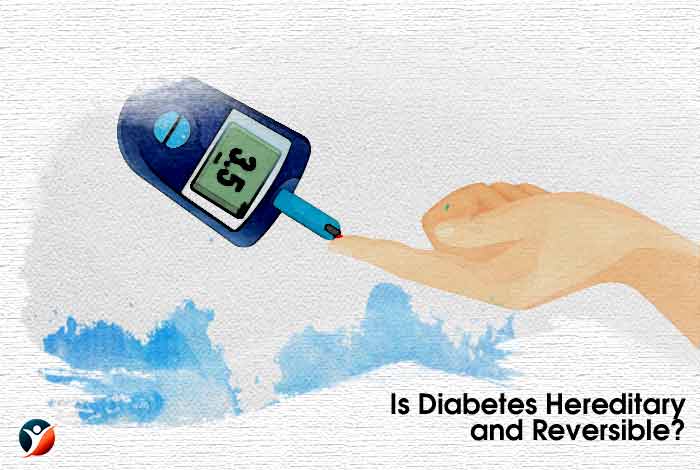
Is Diabetes Hereditary and Reversible?

Table of Content
- Is Type 1 Diabetes Hereditary?
- Is Type 2 Diabetes Hereditary?
- Is Type 1 Diabetes Reversible?
- Is Type 2 Diabetes Reversible?
- Conclusion
Diabetes is one of the complex diseases, which is caused due to various reasons. While a few might be aware of the causes of this chronic disease, there are many who still don’t know whether the disease is hereditary and reversible.
As far as causes are concerned, diabetes can develop due to unhealthy lifestyle, environmental factors and genetic reasons too. It is the condition in which the blood glucose level of the person remains above the normal.
Broadly, the disease can be classified as type 1 and type 2 diabetes. In the case of type 1 diabetes, very less to no insulin is produced in the body. Whereas in type 2 diabetes, the body cells are unable to absorb blood glucose proper functioning of the body. It has been observed that diabetes often runs in families and may be passed on from generations to generations. In case, the mother or father has diabetes, there are chances that the child too suffers from it.

Is Type 1 Diabetes Hereditary?
Type 1 diabetes is an autoimmune disease, also known as juvenile diabetes. Due to this, the immune system of the body attacks healthy cells. As noticed in most of the cases, this type is diagnosed in the childhood and the condition lasts for a lifetime.
Generally, it is observed that if a man had type 1 diabetes, the likelihood that the child will develop the condition is 1 in 17 cases. Similar results are found in women with type 1 diabetes. If a woman gives birth before 25 years of age, the chance of the child having diabetes later in life is 1 in 25 cases. However, if a woman gives birth after 25, the risk of child developing the disease is 1 in 100 cases. In case the parents have been suffering from the disease before 11 years of age, the risk for the child to develop diabetes gets doubled.
According to researchers, most of the Whites with type 1 diabetes have HLA-DR3 or HLA-DR4 genes. The parents and children with these genes are at a higher risk of developing the disease. A test can also be done to check which age group of children are at a greater risk of developing diabetes. [1]
Apart from this, the researchers believe that there are some environmental factors that can lead to type 2 diabetes. The first one is virus since some scientists believe that the development of type 1 diabetes is triggered by viral infections, involving enteroviruses like Coxsackievirus B, cytomegalovirus, rotavirus and rubella.
Secondly, it can be cold weather as most cases of type 1 diabetes are diagnosed in the winter season and is a common issue in cold regions.
Is Type 2 Diabetes Hereditary?
Among diabetics, the most common is type 2 diabetes. It is quite similar to type 1 diabetes as it is partially hereditary. Research has shown that people with a family history of diabetes are more likely to develop this disorder.
Nevertheless, this can also be the result of sedentary lifestyle, poor food habits and obesity. According to a study, more than half of the diabetics get the disease due to unhealthy lifestyle. Some of them develop diabetics because of obesity. In case both the factors exist, the risk of developing the disease increases multiple times.
It must be understood that type 2 diabetes is neither totally hereditary nor genetic. By controlling the lifestyle, type 2 diabetes can be prevented. Else, it may happen to someone with no family history. Also, a person must be cautious when he/she turns 45. At an advancing age, people are more likely to suffer from type 2 diabetes; especially, if they have a sedentary lifestyle.
As a matter of fact, whether a person has Type 1 or Type 2 diabetes, blood sugar level must be controlled. It is advised to understand genetic history and maintain a healthy lifestyle. If these factors are kept under control, a person may prevent or totally avoid the disorder. With this, you can further expect overall wellbeing and a longer life. [2]

Is Type 1 Diabetes Reversible?
This is a serious disorder that can lead to various other complications. These may include heart problems, nerve damage (neuropathy), kidney disease, amputation of body parts, and eye problems like retinopathy and macular degeneration.
It is a chronic condition in which a person needs to inject insulin to keep his/her blood glucose level in check. There is no treatment available that can reverse type 1 diabetes. But, it can be managed. Proper diet and exercise must be followed by diabetics. Additionally, a diabetic must keep track of his/her blood sugar levels at regular intervals.
Is Type 2 Diabetes Reversible?
To manage type 2 diabetes, monitoring of blood sugar levels is strictly essential. This is possible through medications, or injecting insulin if required. The doctors recommend type 2 diabetics to lose weight through exercise and diet. There are some medications available for diabetes that can cause weight loss, which helps in managing diabetes.
Studies show that reversal of this type of diabetes is possible among the diabetics, who have been suffering from this condition for several years. They are advised to eat healthy food, lose weight and exercise daily. These may help reduce or reverse the symptoms gradually. Research has shown that physical activity helps reverse this disorder.[3]
Diabetics, who have experienced the reversal of type 2 diabetes must have noticed significant weight loss. In order to lose weight, commitment to dietary changes and exercise is must.
According to a study, bariatric surgery can help reverse type 2 diabetes. It is one of the few and reliable methods to reverse diabetes and keep it in remission for a longer period of time.
Involve in Physical Activity:
To maintain overall health, it is necessary to exercise daily. This will also help I weight loss. Before a person prepares an exercise schedule, it is better to consult a doctor. It is also advised to follow the below-mentioned mentioned measures:
- Follow a healthy diet
- Start gradually. In case a person is not exercising regularly, it is good to begin with a daily walk. Subsequently, he/she can increase the intensity and duration of the walk.
- Walk with speed. It is better to walk fast as it is a great form of exercise. It does not need any equipment and can be easily done anywhere.
- Do not forget checking blood sugar levels before, during and after workouts.
- Always keep some healthy snacks with you. Whenever the blood sugar level drops while exercising, eat something. [4]
For losing weight, it is better to consult a doctor or nutritionist, who can suggest you a diabetes diet plan. A proper diet aimed at reversing the condition must include:
- whole grains
- limited alcohol
- less calories
- less amount of sweets
- a variety of fresh fruits and vegetables
- same amount of carbohydrates in each meal
- lean protein
With the commitment to meal planning, type 2 diabetes can be reversed. In addition to this, it requires regular exercise and healthy eating. The diabetics are advised to lose weight for getting rid of diabetes and related complications. [5]
Conclusion
Diabetes, be it type 1 or type 2, cannot be completely treated. But, by managing the blood sugar level, one can stay fit and healthy. For this, a healthy diet along with regular exercise plays a great role.
While type 1 diabetes is hereditary, type 2 diabetes is primarily considered a lifestyle disorder and partially hereditary. Further, it is practically impossible to permanently cure type 1 diabetes, but research has shown that type 2 diabetes is reversible and can remain in the state of remission for quite a long period of time.
Nevertheless, diabetics, especially the ones suffering from type 1 diabetes, must keep checking their blood glucose levels at regular intervals. If the blood sugar level is not under control, it can lead to serious health complications. A diabetic must consider his/her diet and lifestyle very seriously.
Hope, the article would help you clearing your doubts related to this chronic disorder. We would like to read your suggestions in the “Comments” section below for anything we missed out here.




